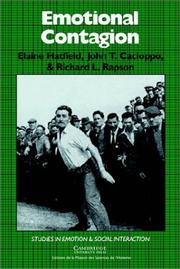| Listing 1 - 5 of 5 |
Sort by
|

ISBN: 0521444985 0521449480 1139930222 1139927272 1139174134 9781139174138 9780521444989 9780521449489 Year: 1994 Publisher: Cambridge Cambridge University Press
Abstract | Keywords | Export | Availability | Bookmark
 Loading...
Loading...Choose an application
- Reference Manager
- EndNote
- RefWorks (Direct export to RefWorks)
When people are in a certain mood, whether elation or depression, that mood is often communicated to others. When we are talking to someone who is depressed it may make us feel depressed, whereas if we talk to someone who is feeling self-confident and buoyant we are likely to feel good about ourselves. This phenomenon, known as emotional contagion, is identified here, and compelling evidence for its affect is offered from a variety of disciplines - social and developmental psychology, history, cross-cultural psychology, experimental psychology, and psychopathology.
Multi
ISBN: 9789811903243 9789811903236 9789811903250 9789811903267 Year: 2022 Publisher: Singapore Springer Nature
Abstract | Keywords | Export | Availability | Bookmark
 Loading...
Loading...Choose an application
- Reference Manager
- EndNote
- RefWorks (Direct export to RefWorks)
This book heightens readers' awareness of the importance of emotional intelligence and how it impacts our lives. It inspires parents, teachers and school leaders to learn more about emotional intelligence as a process of self-improvement, relational skills, and to help our students to develop emotional intelligence from an early stage of their lives. There are four parts in the book. Part 1 explains the importance of emotional intelligence in every aspect of our lives. It presents models and theories of emotional intelligence and explains how our emotions control our mind, body and spirit. Part 2 gives insights into how emotions play a significant role in our relationships with others. Part 3 takes the reader from family to the workplace and highlights the importance of becoming more aware of our emotions at work and how we relate to others. Part 4 emphasises the importance of helping our students to develop essential emotional intelligence to face this increasingly complex and challenging world.
Educational psychology --- Teaching --- Educational sciences --- pedagogische psychologie --- schoolpsychologie --- scholen --- lesgeven --- Emotional intelligence. --- Intel·ligència emocional
Multi
ISBN: 9783658329655 9783658329662 9783658329648 3658329653 Year: 2021 Publisher: Wiesbaden Springer Fachmedien, Imprint: Springer Gabler
Abstract | Keywords | Export | Availability | Bookmark
 Loading...
Loading...Choose an application
- Reference Manager
- EndNote
- RefWorks (Direct export to RefWorks)
The study on the impact of the digital consumer's emotional intelligence based on the moral values promoted in e-business presents an actual interdisciplinary topic in the context of the digital age. The research proposes an original approach to e-business and digital consumer in terms of moral values and emotional intelligence. The Internet has positive effects on consumers and organizations when it is used properly to improve the quality of life. New consumers are more selective, receptive and interested in new technologies. Digital consumers have the opportunity to get informed quickly about products/services offers and e-business provides a simplified acquisition process through diversity and accessibility. About the Author: Ioana Bucur-Teodorescu received the Master degree in Project Management from the Bucharest University of Economic Studies and the Bachelor degree for Business Administration in French. She took her Ph.D. degree in business and administration from the same university, has joined several IT corporations and got expertise working on multiple projects and having certain roles for business and sales operations related to the French market. Her main research interests include e-business, digital consumers, business models related to the internet, and values promoted in the digital era.
Professional ethics. Deontology --- Marketing --- marketing --- deontologie --- bedrijfsethiek --- Electronic commerce --- Consumers --- Emotional intelligence. --- Moral and ethical aspects. --- Attitudes. --- E-books
Multi
ISBN: 9780748627547 9780748631582 0748631585 0748627545 0748652434 1281357642 9786611357641 Year: 2008 Publisher: Edinburgh Edinburgh University Press
Abstract | Keywords | Export | Availability | Bookmark
 Loading...
Loading...Choose an application
- Reference Manager
- EndNote
- RefWorks (Direct export to RefWorks)
Deleuze and Memorial Culture outlines the relevance of Deleuze's thought to cultural studies and the wider phenomenon of traumatic memory and public remembrance.
Philosophy and psychology of culture --- 866 Herdenking en herinnering --- Memorials --- Memorialization. --- Psychic trauma --- Emotional trauma --- Injuries, Psychic --- Psychic injuries --- Trauma, Emotional --- Trauma, Psychic --- Psychology, Pathological --- Memorialisation --- Commemorations --- Historic sites --- Memorialization --- Monuments --- Political aspects. --- Social aspects. --- Deleuze, Gilles, --- Deleuze, G. --- Delëz, Zhilʹ, --- Dūlūz, Jīl, --- Delezi, Jier, --- دولوز، جيل

ISBN: 085991464X 1846153077 9781846153075 Year: 1995 Publisher: Cambridge Brewer
Abstract | Keywords | Export | Availability | Bookmark
 Loading...
Loading...Choose an application
- Reference Manager
- EndNote
- RefWorks (Direct export to RefWorks)
In this study, Norman Klassen shows how Chaucer explores the complexity of the relationship between love and knowledge through recourse to the motif of sight. The convention of love at first sight involves love, knowledge, and sight, but insists that the claims of love and the realm of the rational are in strict opposition. In the metaphysical tradition, however, the relationship between love, knowledge and sight is more complex, manifesting both qualities of opposition and of symbiosis, similar to that found in late medieval natural philosophy. The author argues that Chaucer is unorthodox in exploiting the possibilities for using sight both to express emotional experience and to accentuate rationality at the same time. The conventional opposition of love and knowledge in the phenomenon of love at first sight gives way in Chaucer's development of love, knowledge, and sight to a symbiosis in his love poetry. The complexity of this relationship draws attention to his own role as artificer, as one who in the process of articulating the effects of love at first sight cannot help but bring together love and knowledge in ways not anticipated by the conventions of love poetry.'NORMAN KLASSEN'is a Social Sciences and Humanities Research Council of Canada postdoctorial fellow at the Centre for Medieval Studies and the Department of English Language and Literature at the University of Minnesota.
Chaucer, Geoffrey --- Knowledge, Theory of, in literature. --- Philosophy, Medieval, in literature. --- Vision in literature. --- Love in literature. --- Chaucer, Geoffrey, --- Philosophy. --- Chaucer, Jeffrey, --- Chʻiao-sou, Chieh-fu-lei, --- Chieh-fu-lei Chʻiao-sou, --- Choser, Dzheffri, --- Choser, Zheoffreĭ, --- Cosvr, Jvoffrvi, --- Tishūsar, Zhiyūfrī, --- Chaucer. --- Emotional Experience. --- Knowledge. --- Love Poetry. --- Love. --- Medieval Natural Philosophy. --- Metaphysical Tradition. --- Rationality. --- Sight.
| Listing 1 - 5 of 5 |
Sort by
|

 Search
Search Feedback
Feedback About UniCat
About UniCat  Help
Help News
News